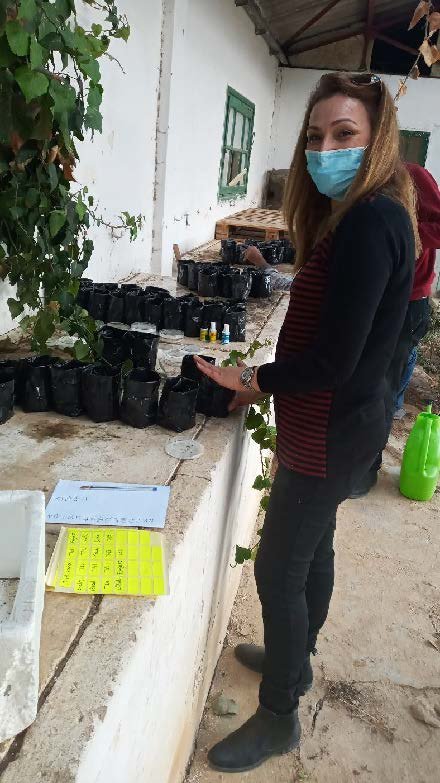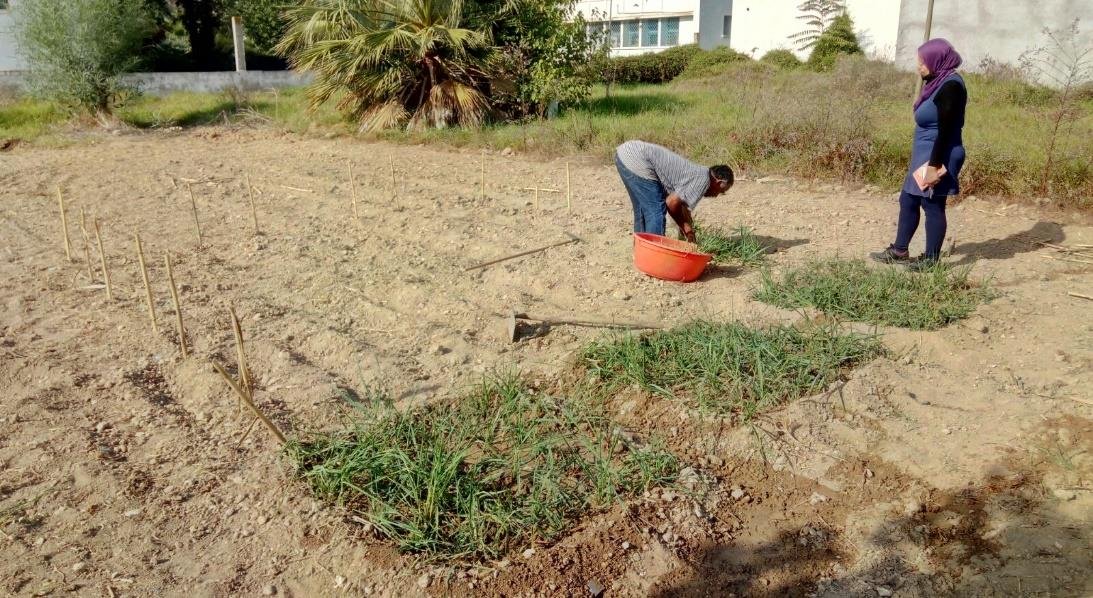|
Cycle 8 (2019 Deadline)
Optimization of perennial grasses to improve forage production in Tunisia (OPGIFT)
PI: Salma Sai Kachout (salmasey@yahoo.fr), National Institute of Agronomy Research of Tunisia
U.S. Partner: Niall Hanan, New Mexico State University (funded by the National Aeronautics and Space Administration)
Project dates: June 2020 - September 2022
Project Overview
 | | Associate Professor Nidhal Ghorbel of FST, the team member responsible for characterizing the genetic diversity of local genetic resources of perennial grasses, transplanting some seedlings. |
The Mediterranean climate of North Africa is characterized by hot and dry summers and cool wet winters, and most global climate models show water supply will be much lower and the air temperatures significantly higher in the coming decades, especially during the summertime. Crop productivity and biomass are typically low under low-rainfall dryland agricultural systems due to abiotic stresses and low input levels. Moreover, more frequent droughts and other climatic risks further exacerbate these trends. This is evident in Tunisia, where wheat and barley production in 2010 was down 33% over the five-year average, due to low rainfall. Livestock production also plays an important socioeconomic role, but limited access to year-round forage for livestock is a major constraint. Perennial grasses grown for livestock are generally drought resistant and require relatively low inputs. They have recently attracted steady interest due to their extensive environmental benefits both at global and agricultural community-scale.
The main objective of this PEER project was to identify high-yielding perennial grasses suitable for Tunisian conditions, optimizing the production chains in order to provide a stable source of biomass to ruminants. To do this, the principal investigator Dr. Salma Sai Kachout and her colleagues researched genetic diversity and physiological traits of plants suitable for Tunisia; studied agricultural practices that are intended to increase the yield, quality, and income of farmers; identified appropriate ruminant diets based on perennial grasses to meet energy and protein requirements; and developed capacity for mapping the grazing lands and trends in forage production in Tunisia. The team sought to enhance livestock performance, provide the basis for a sustainable farming system, and contribute to the empowerment and livelihoods of rural communities.
Final Summary of Project Activities
 | | Project team members setting out the new study plot for Phalaris aquatica at INRAT. |
The PEER team developed their research through a variety of workstreams. In the first, they conducted a field survey to assess management practices for fodder production and feed production for small ruminants. They collected and characterized endemic perennial grasses, new plant varieties, seeds of perennial grasses, and soil samples. Part of this work was to develop pasture mapping capabilities and forage production trends in Tunisia in the long term.
The team used the SRAP molecular marker technique to study the genetic diversity in four forage species of Tunisian perennial grasses, finding high polymorphism information content and high variability, supported in particular by low gene flow.
The researchers conducted growth trials to optimize the production of perennial grasses, identifying accessions of high-yielding grass species and studying the physiology of plants and leaves of perennial grasses. A graduate research trainee was heavily involved in this area, focusing on responses to water stress and the development of molecular markers linked to tolerance to drought.
In addition to their work in the lab and field, the researchers carried out surveys of selected farms to understand their production system for animal feed, including nutritional value and digestibility. They also undertook a socioeconomic analysis to assess the profitability of forage production using perennial grasses and the sustainability of rangelands and their effect on total livestock factor productivity. As part of the PEER project, the PI and team developed a three-year partnership agreement with the laboratory of Molecular Genetics, Immunology, and Biotechnology at Faculty of Sciences of Tunis, University of Tunis El Manar, which will help sustain their efforts even after the end of PEER support.
Publications
S. Sai Kachout, S. Ben Youssef, S. Khnissi, K. Guenni, A. Zoghlami, A. Ennajah, N. Ghorbel, J. Anchang, and N. P. Hanan. 2023. Growth responses of the perennial grass, Phalaris aquatica L., to cutting frequency and influence on secondary metabolites and antioxidant activity. Journal of the American Society of Agricultural and Biological Engineers 66(3): 567-577. https://doi.org/10.13031/ja.15370
S. Sai Kachout, S. BenYoussef, A. Ennajah, S. Abidi, and A. Zoghlami. 2021. Physiological and morphological traits associated with germinative and reproductive stage of garden orache (A. hortensis L. var. rubra) under water stress. Chemical and Biological Technologies in Agriculture 8: 26. https://doi.org/10.1186/s40538-021-00218-7
Back to PEER Cycle 8 Grant Recipients
|
|
|
|





